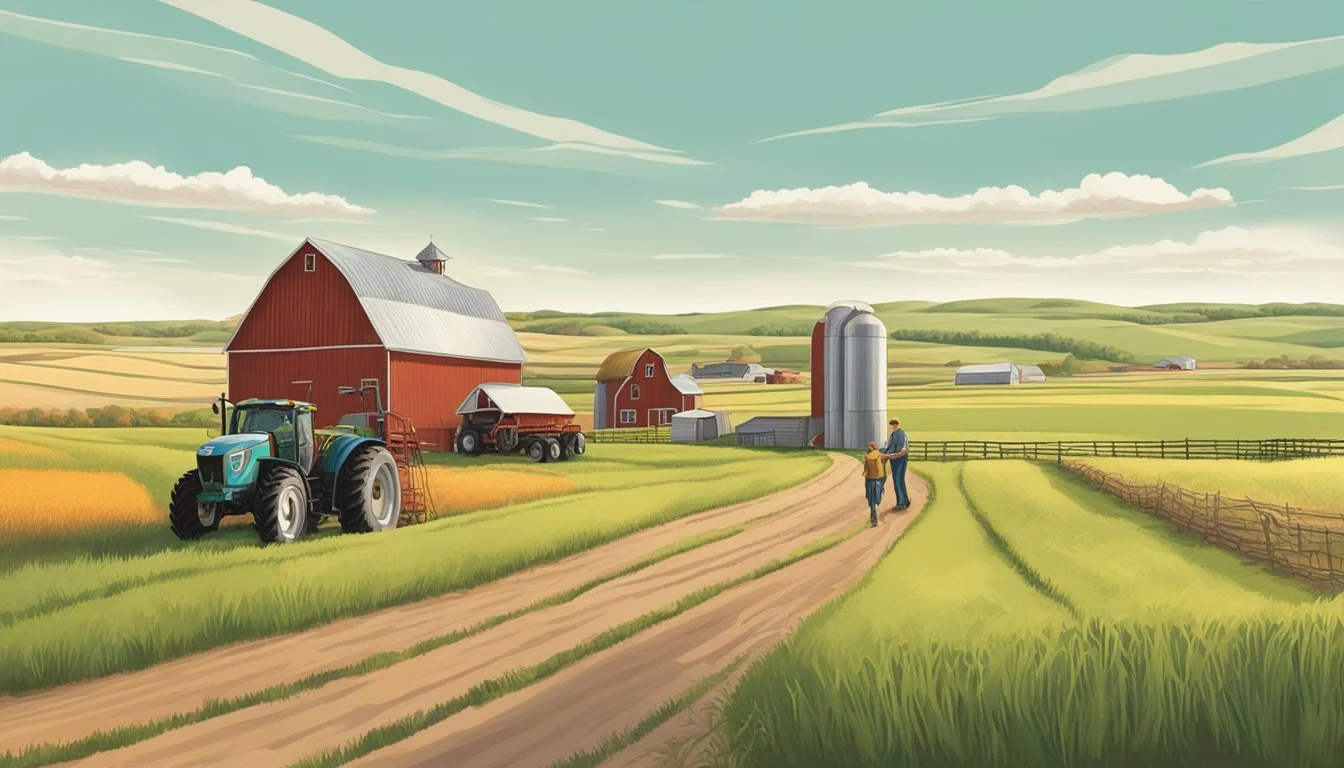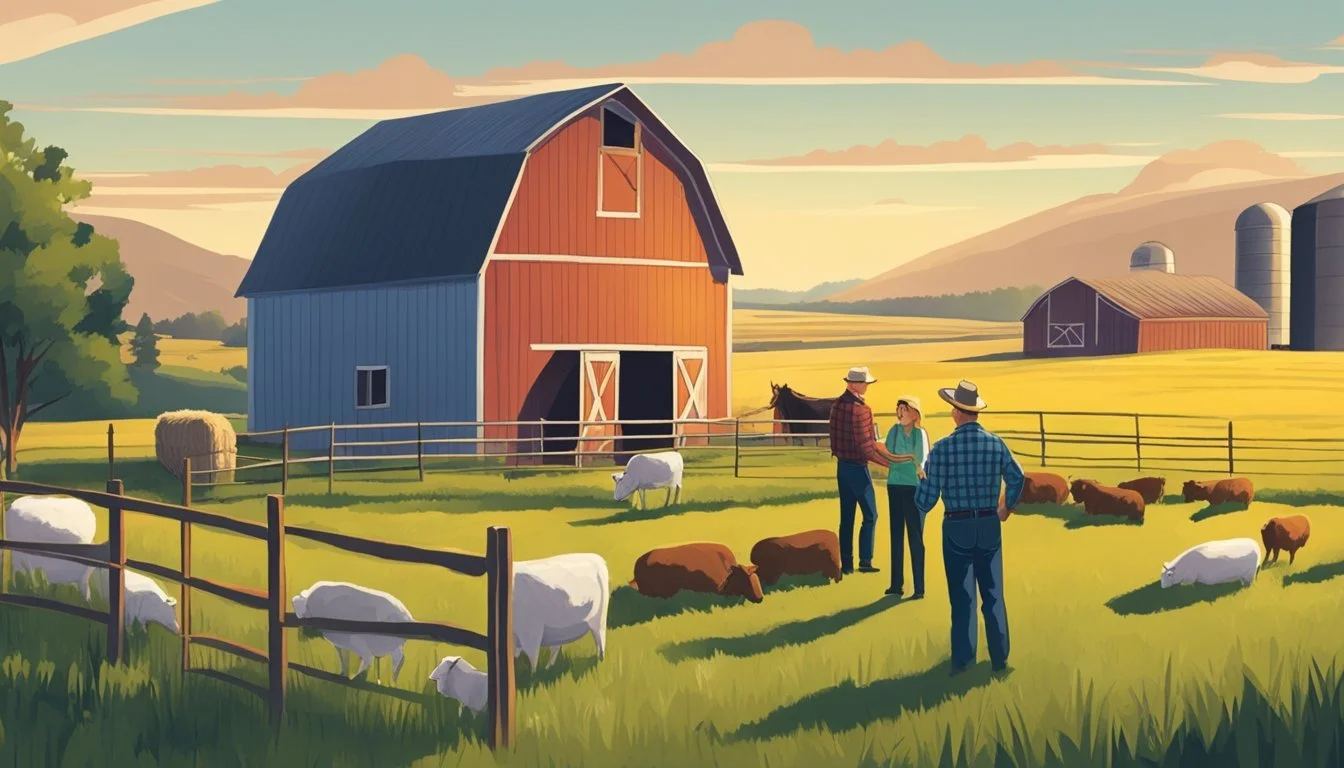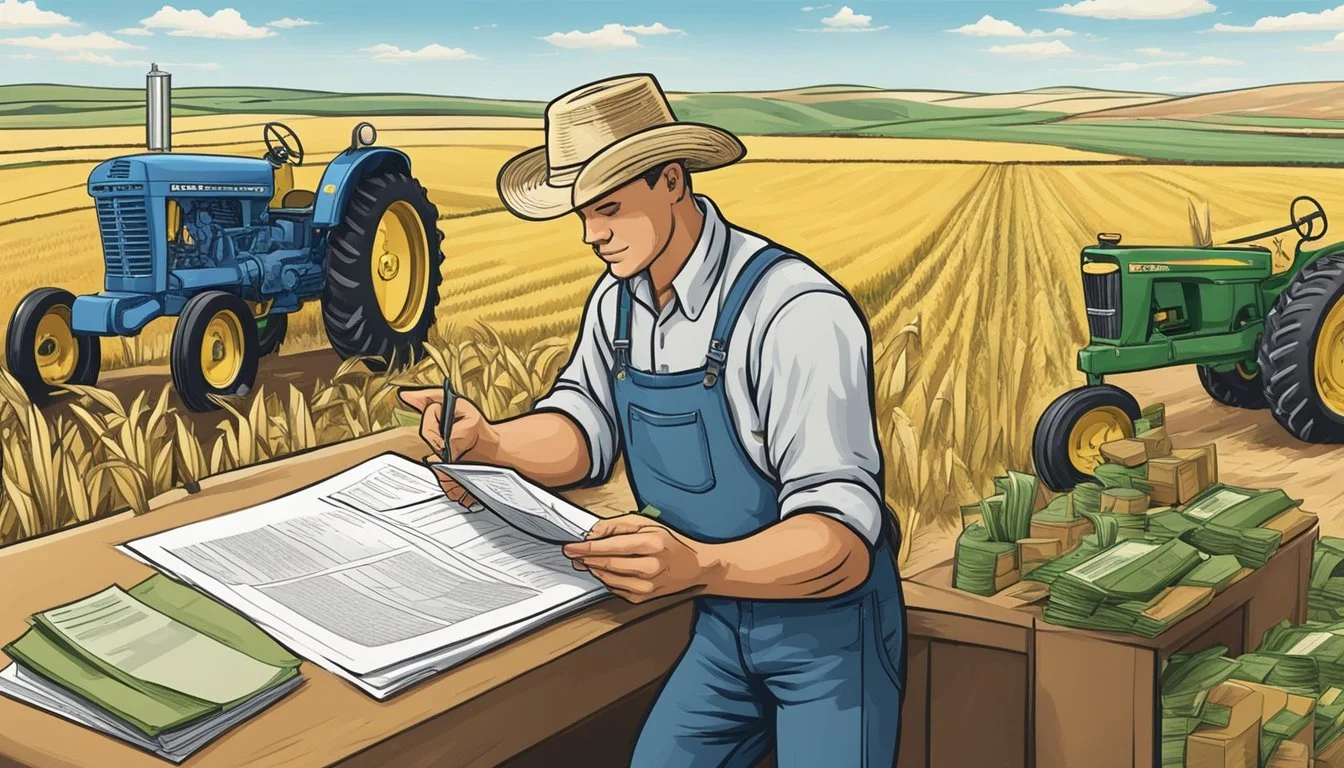Farm Loans in North Dakota
Navigating Your Financing Options
This Article is Part of Our Guide on Farm Loans for All 50 U.S. States
Farm loans in North Dakota provide crucial support to the state's agricultural sector, offering financial resources to new and experienced farmers and ranchers. Tailored to meet the specific needs of the agrarian community, these loans enable the purchasing of real estate, livestock, and equipment, as well as refinancing existing debts. With agriculture being a key component of North Dakota's economy, the availability of such financial assistance plays a vital role in sustaining the industry's growth and stability.
Financial institutions in North Dakota, including the Bank of North Dakota and Dakota Community Bank & Trust, have developed various lending programs to cater to the diverse needs of the farming community. These programs are designed with the intention of assisting farmers in enhancing their operational efficiency and expanding their businesses. Qualifying farmers may also benefit from interest buydowns through initiatives like the Ag PACE program, which supports investments in nontraditional agriculture activities that supplement farm income, underscoring the state's commitment to fostering innovation within the sector.
Moreover, the USDA Farm Service Agency provides further support through its state office in North Dakota, offering programs such as commodity price support, disaster relief, conservation efforts, and additional farm loan opportunities. This comprehensive network of financial support is indicative of a system dedicated to ensuring the prosperity and resilience of agriculture in North Dakota.
Overview of Farm Loans in North Dakota
In North Dakota, farm loans serve as a crucial tool for supporting agricultural operations, ranging from crop production to livestock management. These financial products are tailored to meet the varied needs of the state's farmers and ranchers, ensuring the prosperity of this sector that’s central to the local economy.
Types of Farm Loans Available
Farm Operating Loans: These loans are typically used for current year operating expenses. Farmers and ranchers who meet the eligibility criteria, which often include having a net worth of less than $1,500,000, can access up to a maximum of $750,000.
Real Estate and Improvement Loans: Aimed at financing land purchases or refinancing existing loans, these products may include funds for capital improvements to operations like livestock feedlots or dairy operations. The Bank of North Dakota, for instance, provides loan options catering to experienced farmers and ranchers in the state needing financial support for real estate-related expenditures.
Specialized Agriculture Loans: Beyond traditional farming needs, North Dakota offers financial support through loans designed for nontraditional agriculture activities, such as investment in ag-processing businesses or purchasing irrigation equipment. These loan products encourage diversification and innovation in the agriculture sector.
Interest Buydown Programs: The Ag PACE program helps reduce the interest rate on loans for farmers investing in specialized sectors of agriculture.
Importance of Farm Loans for Local Economy
Farm loans in North Dakota play a pivotal role in sustaining the agricultural heart of the state. Agriculture is a cornerstone of the local economy, contributing significantly through the production of crops and rearing of livestock. By providing necessary financial support, farm loans enable farmers to maintain and expand their operations, thereby supporting economic stability and growth in the region. Access to adequate funding allows for the adoption of modern farming practices and technology, which in turn can bolster productivity and profitability in the competitive agricultural market.
Applying for Farm Loans
When seeking farm loans in North Dakota, prospective borrowers should be aware of the eligibility requirements, the loan application process, and the necessary documents to apply. These factors are critical in securing financial support for agricultural endeavors.
Eligibility Criteria
Eligibility for farm loans typically requires an applicant to be an experienced farmer or rancher. In North Dakota, a net worth of less than $1,500,000 is often a criterion for loan programs. The loans may be used for various purposes, including real estate, livestock, or equipment purchases and refinancing.
Applicants: Experienced farmers/ranchers in North Dakota
Net Worth: Must be less than $1,500,000
Uses: Real estate, livestock, equipment, refinances
Loan Application Process
To apply for a farm loan, individuals should approach a loan officer at a bank or an agricultural lending institution. The loan officer will guide them through the application process, which may involve determining the appropriate loan program and loan amount according to the farmer's needs.
Contact a loan officer.
Discuss suitable loan programs.
Determine the loan amount appropriate for business needs.
Required Documents
Applying for a farm loan requires the submission of certain documents that provide financial information and validate eligibility. These can include proof of identity, financial statements, and a detailed plan of the intended use of the loaned funds.
Proof of Identity: Driver's License, Passport, or other government-issued ID
Financial Statements: Include recent bank statements, tax returns, and any other financial documentation.
Detailed Plan: Explanation of how the loan will be used, detailing the nature of the agricultural project.
It is important for farmers to prepare these documents in advance to streamline the application process.
Loan Products and Services
North Dakota financial institutions offer a variety of loan products tailored to support the specific needs of its agriculture industry. These loans typically cover real estate, operations, and equipment purchases, with terms designed to accommodate the financial cycles of farming and ranching.
Real Estate and Land Loans
Real estate and land loans facilitate the acquisition or refinancing of property. In North Dakota, qualified farmers and ranchers can receive loans with a maximum limit of $750,000. These loans are structured to support the purchase of real estate including farm land. The Farm Service Agency may be involved, offering guarantees to lenders for additional security.
Loan Uses: Purchase of farm land, real estate acquisition, refinancing of existing property.
Collateral: Typically the land or real estate being financed.
Operating Loans and Lines of Credit
These financial products provide the necessary funds for the current year's operating expenses. Operating loans and lines of credit offer flexibility for recurring costs, with North Dakota farmers having access to a maximum loan amount of $750,000. This aids in managing cash flow and sustaining day-to-day operations throughout the agricultural season.
Loan Uses: Seed, fertilizer, fuel, labor, and other operational expenses.
Note: Short-term flexibility, tailored to seasonal cash flow needs.
Livestock and Equipment Loans
Designed for the purchase or upgrade of livestock and farm equipment, these loans are essential for maintaining and enhancing productivity. In North Dakota, financing can cover a range of needs from livestock acquisition to investing in new tractors or harvesting equipment. The terms of these loans consider depreciation and are secured, often by the chattel—the physical items like livestock and machinery—being financed.
Loan Uses: Purchase of livestock, vehicles, irrigation equipment, and other farm machinery.
Collateral: Often the equipment or livestock itself.
Lenders and Loan Officers
When seeking farm loans in North Dakota, the proficiency of lenders and the expertise of loan officers are crucial for farmers and ranchers. An informed choice can lead to beneficial financial support.
Choosing the Right Lender
The right lender is foundational for securing the necessary funds for farming activities. Key factors include:
Experience in Agribusiness: They should have a deep understanding of farming needs.
Financial Health: Lenders should have a strong financial track record.
Terms and Conditions: Reviewing their loan terms for clarity and compatibility with the borrower's financial situation is essential.
One should consider whether a lender is a lead or local lender, as local lenders typically have a more intimate understanding of the agricultural landscape in North Dakota.
Role of Ag Loan Officers
Ag loan officers specialize in the agricultural sector, offering tailored advice and financial products. Their responsibilities include:
Assessing the Applicant: Evaluating the financial position and needs of the farmer or rancher.
Structuring Loans: They align loan structures according to the farm's operational requirements.
It's important that these officers keep the borrowers' best interests in mind, as noted in the context of Dakota Community Bank & Trust’s approach.
Local Lender Partnerships
Collaboration between lead lenders and local partners can provide several benefits:
Extended Reach: It allows for a wider distribution of financial services.
Local Insight: Local lenders contribute valuable knowledge on regional agricultural challenges.
Entities such as the Bank of North Dakota often participate in these partnerships, offering programs like the Ag PACE that supports farm income diversification through loans for nontraditional agriculture activities.
Financial Planning and Management
Effective financial planning and management are crucial for North Dakota farmers to ensure the long-term sustainability of their operations. This involves a keen understanding of interest rates, developing strategic repayment plans for loans, and knowing when to restructure or refinance existing debt to maintain a healthy cash flow and net worth.
Understanding Interest Rates
Farmers should monitor interest rates regularly, as they can significantly impact the cost of borrowing. Interest rates fluctuate based on market conditions and can vary between different loan programs. Lower interest rates reduce the amount paid over the life of a loan, increasing a farm's profitability.
Fixed interest rates: A set rate that does not change during the term of the loan.
Variable interest rates: Rates that fluctuate with market conditions.
Loan Repayment Strategies
A strategic approach to loan repayment can alleviate the burden of operating debt. Farmers should consider their cash flow and profit margins when devising a repayment plan. Formulating a strategy typically involves:
Prioritizing loans with higher interest rates.
Allocating profits to pay down principal faster when possible.
Maintaining a reserve fund to handle any unexpected cash flow challenges.
Effective strategies can not only reduce interest over time but also improve a farmer's net worth and borrowing capacity for future needs.
Restructuring and Refinancing Loans
Restructuring and refinancing are viable options for farmers who are struggling with existing debt or who wish to take advantage of better interest rates. Refinancing might involve:
Extending the loan term to lower monthly payments, but potentially increasing the total interest paid.
Consolidating multiple loans to simplify payments and possibly reduce interest rates.
Farmers should consult with loan officers and assess their financial situation thoroughly to determine if restructuring debt is conducive to their long-term financial health.
Government Programs and Support
North Dakota offers a variety of government programs and support mechanisms designed to assist farmers and ranchers with their financial needs, especially geared towards conservation efforts and sustainable agricultural practices.
FSA Programs and Guarantees
The Farm Service Agency (FSA) provides numerous programs to North Dakota's agricultural community. Notably, the Conservation Reserve Program (CRP) allows producers to remove environmentally sensitive land from agricultural production to improve water quality and wildlife habitats. There is also the Emergency Conservation Program (ECP) which aids farmers in disaster recovery, and for those looking to enhance their land's capabilities, the Farmable Wetlands Program and Grasslands Reserve Program are available. Guaranteed loans are a crucial part of the FSA’s support, providing lenders with a federal-backing that enables farmers, including beginning farmers, to access financial assistance.
North Dakota Department of Agriculture
The North Dakota Department of Agriculture works closely with producers to secure the benefit from resources such as commodity price support and disaster relief. This department's mission harmonizes directly with maximizing the value that farmers and ranchers receive from state-administered programs.
Grants and Ag PACE Programs
Grants are offered to farmers who pursue innovative agricultural practices. Additionally, the Ag PACE program targets those investing in nontraditional agriculture activities that supplement farm incomes. This includes buydown interests on loans used for purchasing equipment or investing in agricultural processing businesses, benefiting entities like livestock feedlots and dairy operations. These financial tools are intended to bolster the economic viability of the agricultural sector in North Dakota.
Common Questions and Concerns
When seeking farm loans in North Dakota, applicants typically have several questions and concerns regarding the process of contacting loan representatives, understanding loan approval considerations, and handling potential loan rejection.
Contacting Loan Representatives
Prospective borrowers can reach out to loan representatives through the Bank of North Dakota or the USDA Farm Service Agency to discuss loan options. The representatives provide guidance on the lending criteria and collateral requirements. To facilitate this, most institutions offer a Contact Us section on their websites for scheduling appointments or making inquiries.
Email and Phone: Check for dedicated contact information for agriculture loan services.
In-Person Meetings: An appointment can be scheduled for a detailed discussion regarding a borrower's needs.
Loan Approval Considerations
The loan approval process in North Dakota evaluates several factors, including the applicant's credit history, net worth, and collateral. An experienced farmer or rancher in North Dakota often must have a net worth less than $1,500,000 and a sound credit history to be considered.
Loan Amount: Maximum loan amounts often are capped ($750,000 for some programs).
Credit History: Strong credit may enhance the chance of approval, while weak credit may necessitate additional steps.
Handling Loan Rejection
In cases where a loan application is denied, applicants should first request a detailed explanation from the lender to understand the factors that contributed to the rejection. Subsequently, they can take steps to address issues such as improving their credit or adjusting the collateral offered.
Review and Adjust: Evaluate the lending criteria and make necessary improvements.
Alternative Resources: Explore other lending options like local credit unions or USDA updates that might offer more favorable terms or cater to historically underserved producers.
Advanced Loan Features and Terms
Farm financing in North Dakota offers robust options to support farmers and ranchers in achieving their business goals.
Loan Participation and Requirements
Farm loans in North Dakota typically require the borrower to meet specific participation requirements. These loans target experienced farmers and ranchers with a net worth of less than $1,500,000. For instance, the Family Farm Loan Program necessitates collateral and outlines additional prerequisites for taking part in the program.
Long-Term Financing
Long-term financial solutions are key in North Dakota’s agricultural loan offerings. Long-Term Financing through programs like North Star CCU's Ag Real Estate Loans feature terms up to 25 years. They incorporate options for purchasing, making improvements, and refinancing rural real estate, farmland, and facilities.
Specialized Loan Products
North Dakota provides several specialized loan products that cater to diverse agricultural needs. The Bank of North Dakota has programs like Ag PACE, which provides interest buydown on loans for investment in non-traditional agriculture. These could cover equipment for projects that diversify income sources, including investments in ag-processing businesses or improvements like dairy operation upgrades.
Economic Impact and Community
In North Dakota, the economic viability of communities is significantly bolstered through targeted loan programs. These initiatives are crucial in fostering rural development and supporting both new and expanding farms.
Loans for Rural Development
Rural Economic Development Loan & Grant Program enables the local utilities to apply for USDA funding that supports a wide array of local projects. Specific to North Dakota:
Maximum Loan Amount: $2 million per project
Beneficiaries: Local projects through the intermediation of local utilities
Applications can be initiated pre-approval, but funding isn't guaranteed. When projects receive the green light, the USDA releases funds accordingly which, in turn, spurs community growth and economic development.
Support for New and Expanding Farms
The Bank of North Dakota (BND) provides diverse loan options tailored to meet the unique needs of:
Start-up farms: Credits that facilitate the initial steps for emerging agricultural producers
Expansion: Financial support for existing farms to increase their scale and enhance their productive capacity
By administering legislative-directed loan programs, BND creates a robust support network that stimulates not only the agricultural economy but also influences states’ economic landscapes. These financial boosts have touched upon numerous communities, translating into direct economic impacts and sustainable community development.









